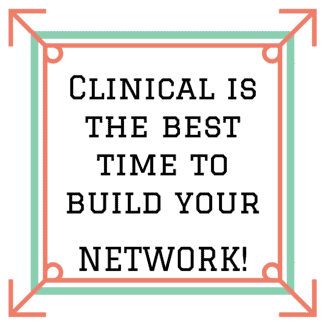You may have tried traditional methods of applying to jobs such as filling out online applications and submitting resumes.
But with minimal success.
Have you ever given a thought to the fact that:
what could be stopping you from getting that job you applied for?
Well there is a very important ingredient that is usually found to be missing. And that is
Not knowing the right person who will make the decision to hire you.
And how do you make yourself known to the person who will hire you?
Through networking!
“Networking is marketing. Marketing yourself, marketing your uniqueness, marketing what you stand for”. – Christine Comaford-Lynch
It is an essential part of your job search.

In this article you’ll learn:
- how important a role networking plays in you landing that job you applied for, and
- how to establish connections and grow your network that effectively enables you to get hired.
WHY NETWORK?
In recent years, we have seen an entry of multitude of job search sites such as Monster, Workopolis, and Job bank just to name a few.
These all are great websites, however the traditional wisdom that most of the jobs are found through networking, still holds true.
According to recent studies, 60% to 80% of all jobs are obtained through personal relationships.
According to Alicia Pierre, a nurse and blogger who authored Networking Is the Best Way to Find a Nursing Job says:
“Networking is about connecting with people and building a strong ‘base’ or ‘network’. If you are like most nurses, the idea of nursing probably doesn’t sound appealing. I used to feel the same way. This is probably because your concept of networking is flawed. Networking is one of the most successful ways to find a nursing job”
Pierre argues that networking is largely beneficial as it serves to facilitate and increase learning opportunities, allows one to share their gifts and talents with others and enables job seekers to remain connected to influential individuals.
Let’s take nursing for example.
Studies indicate that 10,827 Registered Nurses (RNs) graduated in 2011 yet more than a year later, only 2,212 were hired in full-time positions.
As you can see, there is clearly a discrepancy between the number of nurses who are trained and, qualified to be employed within the field and the those who successfully managed to find a position.
This is true for the PSW industry as well.
Each year, a little less than 10,000 PSW’s graduate with diplomas from various Community or Private Career Colleges and District School Boards, however a very few, if any, are able to secure employment.
Although there could be a multitude of factors causing this, however considering the effectiveness of securing connections for gaining employment is essential.
HOW TO BUILD A NETWORK?
BEFORE COLLEGE
Establishing useful and valuable connections prior to enrolling in a college has become more and more prevalent.
Experts agree that individuals who are seeking to obtain a position in a particular field optimize their chances of success by developing connections early on.
“You shouldn’t network because you’re desperate — you should network all the time. You should always be making contacts and have a Rolodex or computer program that lets you file these people away” – Larry James
Essentially,
making a concerted effort to lay the groundwork for developing beneficial connections can take place as soon as you decide to become a Personal Support Worker.
Definitively identifying exactly who is in the position to assist you by conducting preliminary online searches on professional sites has been found to be extremely effective.
Commonly used social media and networking sites such as Facebook and LinkdIn are great resources for network building.
In addition, certain association websites such as Ontario Personal Support Worker Association (OPSWA), not only allows you to learn the vagaries of the PSW world but can ultimately result in making connections that you will need post-graduation.
WHILE IN COLLEGE
The time you spend in a college obtaining your PSW diploma,is the ideal time period for building connections and strengthening ones that had previously been established.
” The experts agree that networking is not last-minute effort, relationships take time to cultivate. Even if they already have a job or are committing to school full-time, students should still look for new contacts with people in their field.” Larry James
While you are in college, faculty members, career assistant department and other support staff can guide you as well.
BECOME A VOLUNTEER
Believe it or not, it is relatively much easier to establish connections in health care.
There are substantial amount of volunteering opportunities that are inherent in health care such as in hospitals, hospices and nursing homes.
All the organizations that hire PSW’s provide opportunities for you to volunteer.
By working in a target-rich environment as volunteers both prior to and during school, you will be able to interact with individuals who can influence the decision to hire you as and when you apply for a job.
WHILE DOING YOUR CLINICAL
Personal Support is inherently an easier field to develop networks.
This is due to the fact that all PSW courses require you to complete a clinical placement.
 Clinical are intensive, hands-on training geared towards enabling prospective PSW’s to learn practical skills.
Clinical are intensive, hands-on training geared towards enabling prospective PSW’s to learn practical skills.
They also help you gain the on-site experience needed to embark on your career.
This is the best time to build connections and seek references.
Many PSW’s assert that their clinical provided them with the “in” that they needed when seeking a position after graduating.
Recent graduates confirm that they have used the connections they made during their clinical.
When contacted, administrative staff at both Manitoba’s Saint-Boniface Hospital and a Vancouver-area medical centre, stated that there are no specific programs at their respective facilities that offer positions geared towards allowing prospective students to gain practical work experience other than the requisite clinical.
This further strengthens that volunteering positions and clinical enable current and future PSW’s make the connections required.
TIME FOR ACTION
Once you have successfully completed your PSW program, the onus is upon you.
Find a position within your chosen field using whatever resources that are available.
The connections that were identified prior to attending college which are later fostered during your years as a student should be used upon graduation while embarking on your career.
Recent graduates admit to taking advantage of this strategy.
Tap into your network that you have established to send subtle “reminder” emails, stating that your are looking for a job.
Evidently, such emails are sent prior to the PSW job candidate formally applying for the position.
This has been proven to increase the likelihood of applicants being granted an interview.
With your intensive and time-consuming studies completed and the required training obtained, you can now take advantage of the opportunity to dedicate yourself completely to securing a position.
 While effectively “pounding the pavement “by wearing a business suit, carrying a suitcase, business card and attending various conferences, conventions and career fairs aren’t typically associated with PSW’s.
While effectively “pounding the pavement “by wearing a business suit, carrying a suitcase, business card and attending various conferences, conventions and career fairs aren’t typically associated with PSW’s.
Following two tactics should be part of a your job search activities:
- Making follow-up phone calls to prospective employers, and
- Conducting “informational interviewing” of current and more established Personal Support Workers.
Such practices are apparently effective.
Louise P, employed at a chronic care facility in Ottawa for over 20 years confirms:
“I’ve seen people get jobs solely through their contacts. If someone is friends with one of the higher-ups, they can get a job even if they aren’t qualified for it. They even get chosen over other candidates who actually do have the education and training it requires. It has become more and more blatant lately too.”
CONCLUSION
Clearly, obtaining position as a Personal Support Worker has become increasingly dependant on new PSW’s having the advantage of knowing someone who has the ability to either help themselves or introduce them to someone who can.
It is evident that the information pertaining to job connections culled both prior to and while completing the diploma can be beneficial once you are attempting to enter the workforce.
Connections will play a huge role in your search for work opportunities.
Before, during and after attending college, PSW’s can and often do take advantage of the networking and connection-building options that are inherent in this field.
Future and current Personal Support Workers are faced with the inescapable reality that ultimately of having friends in “high places” that make all the difference.






